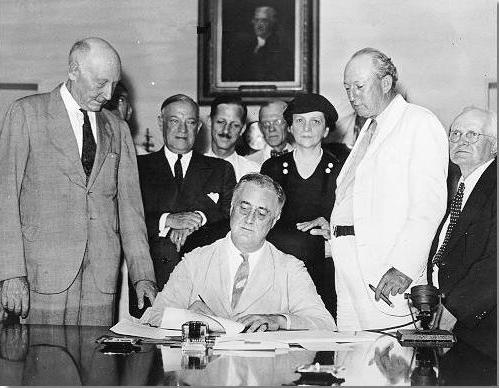Public trustee bemoans break with historic self-financed structure
President Franklin D. Roosevelt must be rolling in his grave. When FDR signed the Social Security Act into law in 1935, he emphasized that the system would be financed by workers' contributions, not by general tax revenues.
“We put those payroll contributions there so as to give the contributors a legal, moral and political right to collect their pensions,” the 32nd president of the United States explained more than 75 years ago. “With those taxes in there, no damn politician can ever scrap my Social Security program.”
But leave it to those damn politicians to muck up a good thing.
In 2010, President Obama and Congress agreed to reduce the payroll tax — the principal financing stream of the Social Security system — to stimulate the economy. They agreed to tap general revenues to make up the difference in funding promised benefits.
“This shift threatens to fundamentally alter Social Security's intended designation as an earned benefit, as well as the long-standing protection that status provided,” said Charles Blahous, a senior research fellow at the Mercatus Center at George Mason University and a public trustee for Social Security and Medicare.
For decades, a strong bipartisan majority remained firmly committed to FDR's vision, Blahous wrote in a new study released this week. The political right valued the contribution-link as ensuring critical fiscal discipline, whereas the left valued it for protecting benefits from having to compete annually with other programs for funding.
But that changed when the employee share of FICA taxes was reduced by two percentage points from 6.2% to 4.2% in 2011. Congress agreed to extend the payroll tax holiday for another year in 2012. The tax reduction saves the average worker earning $50,000 per year about $1,000 — money that Congress and the president hoped consumers would spend, pumping up the economy.
The back-to-back payroll holidays cost about $217 billion. And because those transfers that were added to the Social Security Trust Funds which earn interest, by 2033 they will have compounded to a taxpayer-financed subsidy of roughly $600 billion, Blahous wrote.
“Overnight this provision transformed Social Security from a program in which general revenue financing had historically been negligible to one that relies significantly on subsidies from the general fund,”
The question is with the continued slow economic recovery, will Congress go for a three-peat? Without further action, the portion of the payroll tax that finances Social Security will reset at 6.2% rate on January 1, 2013. In addition, workers pay 1.45% of all their wages to finance Medicare. Employers contribute 7.65% of employees' wages and self-employed individuals pay the full 15.3%.
Blahous hopes Congress will let Social Security resume its pay-as-you-go status. But, he worries, that the psychological damage has already been done. The break in Social Security's contribution-benefit link could transform public perception of the program into something more akin to welfare, opening the door for policy changes such as means-testing, he warned.
Regardless of who wins the White House in November or what Congress decides to do about ending or extending the payroll tax cut, the larger challenge of Social Security reform is looming.
In 2010, the Social Security system took in less money in taxes than it paid out in benefits largely due to high unemployment during the Great Recession. As a result, fewer workers paid taxes and more people were forced to collect retirement benefits early. Thanks to a surplus of tax revenues collected since the landmark Social Security reform legislation of 1983, there were sufficient resources to pay all the promised benefits.
But without further action to raise taxes, trim benefits or otherwise alter the program, the retirement trust fund will run dry by 2033 — and the disability trust fund well before that. Congress must act to protect what some have called the most successful government program in history. FDR is watching.







